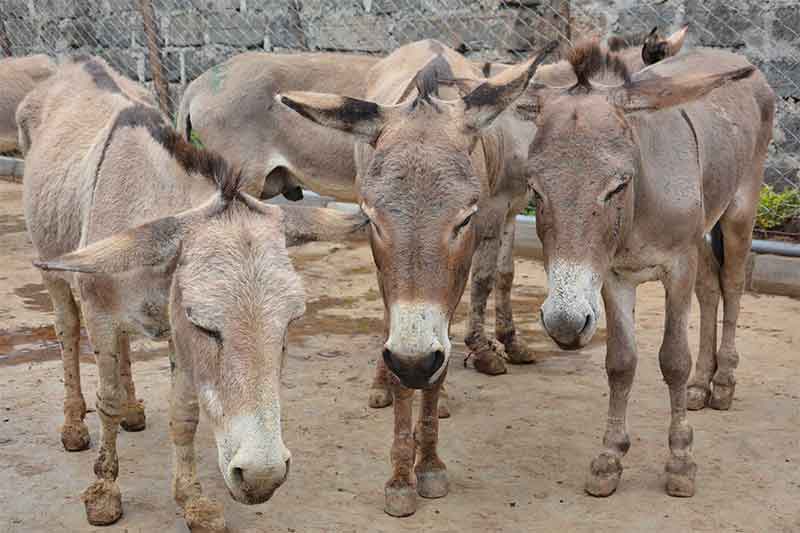by Florence Foo, Si Cheng, and Taciana Santiago

The Memphis Zoo has the blood of giant panda LeLe on its hands. Zoo officials disregarded multiple pleas from our organization, Panda Voices, and our partner organization, In Defense of Animals, to look into the health condition of the 24-year-old male giant panda based on a video taken by a zoo camera that clearly displayed a sick animal in need of medical treatment. The negligence shown by the Memphis Zoo amounts to animal cruelty.
Since mid-January and in the last weeks prior to giant panda LeLe’s tragic and preventable death on February 1, Panda Voices posted extensive observations of LeLe’s declining health on our social media in a bid to alert zoo officials. Several emails were sent to the zoo and also phone calls were made alerting them about LeLe’s condition, but all of these attempts were simply ignored and no action was taken by the zoo. LeLe had a loss of appetite and was showing signs of weakness, lethargy, and digestive problems, and even collapsed a few times.
People across the world shared concerns with us and IDA. Our organizations issued a joint press release on January 30 alerting the media about the alarming worries regarding LeLe’s health. Screenshots published on both Panda Voices and IDA’s social media in January showed LeLe’s health issues and asked the Memphis Zoo to urgently act to investigate what was happening with the male panda.
On February 3, Memphis Zoo announced that LeLe had passed away on February 1. In their press conference held on the same day, when asked about LeLe’s recent health, they said: “We saw no indication that would lead us to believe there is anything wrong with LeLe.” And when the journalists asked about the concerns raised by Panda Voices and In Defense of Animals about LeLe’s recent lack of appetite, weakness, and collapse, they evaded the issue, saying that LeLe “was just being silly,” “he acts dramatically,” “he was simply lying down on that video,” and “he was always making people laugh.” Memphis Zoo president Matt Thompson took a swipe at activist groups, saying that they “are taking this opportunity to continue to tell untruths.” He added, “That’s unfortunate.” What’s unfortunate is that LeLe ultimately died from neglect, and Thompson refuses to admit it.
Any observer of videos recorded on January 15, January 25, and on the last full day of his life on January 31 can clearly see that LeLe was weak, had a loss of appetite, found nothing palatable around him, fell to the floor, and slept. Despite being terribly weak, he still tried to beg for food. At one point, he struggled to climb the stone and stood there, trying his best to beg for food as he usually did, but he failed and he got nothing. The next morning, LeLe’s lifeless body was discovered. If the zoo were really watching their cams (they claimed in the press conference that the pandas are always being monitored either physically or by cam), they would have seen several indications that LeLe was unwell.
It is also worrying that another video recorded on September 29, 2022, shows LeLe also lethargic and having severe diarrhea, which raises the possibility that his health problems started months ago and only escalated in January, culminating in his emaciated, weak, and skinny appearance, and ultimately, his death.
So when Memphis Zoo said there was no indication there was anything wrong with LeLe, it was either they really did not notice (which, if true, does not inspire any confidence in their ability to care for their animals), or they are not being truthful. If they really hadn’t noticed LeLe’s health deteriorating, this alone is a major cause for concern. This may indicate that they are so used to seeing the pandas being inactive and begging for food that it has become a norm.
Panda advocates from all over the world also emailed the zoo and sent direct messages on their social media on several different days throughout the month of January to help LeLe. Fans noticed that LeLe had shown signs of illness for at least half a month. One of the concerned panda lovers sent multiple emails and even begged the zoo when describing LeLe’s situation in an email sent on January 26: “Don’t let [him] die there! [He] must be sick! Aren’t you guys worried? I’m down on my knees begging you”; and also on January 31, the day before he died: “Please, go to see him and don’t let him die.” If Memphis Zoo had taken the time to check and provide medical treatment and more soft and nutritious food to help him improve his health, his death might have been prevented. But the zoo just turned a blind eye to his symptoms and desperate pleas from advocates for help.
LeLe’s death appears to be a case of neglect and could amount to animal cruelty.
Usually, when pandas have no interest in food for several days and sleep excessively, the vets will get involved as it might be an indication that something is wrong. The zoo always claimed that they perform regular checks on both LeLe and YaYa and during the press conference held on February 3, they stressed that both pandas were monitored 24 hours a day. They mentioned LeLe was not sick during his last days and he only had an upset stomach for one day. However, according to the statement released by the Chinese Association of Zoological Gardens (CAZG) on February 26, the initial investigations regarding LeLe’s passing revealed that he passed due to heart failure. Animal advocates and panda fans worldwide are wondering why Memphis Zoo never realized he had a heart problem, as they claim they regularly monitored him, and worse, why the zoo didn’t pay attention to his dangerous symptoms like weakness, lethargy, collapses, and lack of appetite. LeLe was probably in pain and definitely succumbing to his heart disease. LeLe was not falling down to entertain his visitors. He collapsed because his heart was failing.
Moreover, a significant number of people are complaining on Panda Voices social media that Memphis Zoo is blocking them and deleting their comments on Facebook, Twitter, or Instagram, just because they are asking the zoo for more details about LeLe’s passing and YaYa’s daily care, which can be interpreted as a lack of transparency of the zoo and an interest in hushing up the case.
After LeLe’s death, the zoo announced to the media that he was 25 years old. The truth is, if he had survived, LeLe would have turned 25 on July 18, 2023. He was younger than other pandas living in the U.S., such as TianTian, LunLun, YangYang, and former San Diego Zoo couple BaiYun and GaoGao, who are now over 30 years old and thriving in a sanctuary in China. LeLe’s mother, XinXing lived until 38 in China. The longest-living panda in captivity, XinXing outlived her son by 14 years.
LeLe was forced to beg for food even on the last day of his life. It is unacceptable that after receiving so many alerts from animal organizations and pandas fans worldwide about LeLe’s health deterioration during the whole month of January, including desperate and urgent requests to not let him die, Memphis Zoo did not improve his diet and care nor gave LeLe a thorough medical check-up. And even worse, after his death, the zoo still claims there was no indication something was wrong with him.
It is important to note that for several years, animal organizations like Panda Voices and In Defense of Animals, as well as thousands of panda fans all over the world—including the Oscar-winning singer Billie Eilish—have urged the Memphis Zoo to not only improve the care of their giant pandas but effect their return to China, where they would be cared for properly. Concerns were raised regarding the pandas being underweight, LeLe’s broken teeth, YaYa’s parasite infection, the low quality and small quantity of the zoo’s bamboo (the staple diet of pandas), the lack of a variety of supplement food and the obvious signs of stereotypical stress behaviors both pandas often display.
In addition to the questionable quality of the bamboo provided for YaYa and LeLe, which both animals often refused to eat, Memphis Zoo frequently stated in their videos that they have plenty of bamboo on their farm. At the same time, they requested bamboo donations from the local citizens to feed YaYa and LeLe. Relying on local bamboo donations is not safe for the pandas, nor does it guarantee the continuous supply needed for them. On top of that, Memphis Zoo used to sell bamboo from their farm to Toronto Zoo in Canada in order to feed their former pandas DaMao and Ershun. Why sell bamboo to others, if you don’t even have enough to feed your own pandas? Could it be that making money is more important to the zoo than providing adequate animal care?
Unfortunately, it seems that the giant pandas in Toronto Zoo did not like the bamboo from Memphis, as stated in an article published by Meagan Campbell in the Canadian media: “Keepers deduced she (ErShun) was unsettled by the bamboo, which came from Memphis, and in the case of Da Mao, the keepers feel the bamboo isn’t very palatable for him more often than it is tasty. Fortunately, the zoo soon received bamboo from Cincinnati—a preferred food item.” Therefore, it is this unpalatable bamboo that LeLe and YaYa need to eat every day. It is widely known that pandas are picky eaters and will reject bamboo that does not smell pleasant to them. In a recent video of YaYa recorded on February 10, it can be seen that the skinny and fragile bear smelled the very few bamboo poles given to her in the yard, refused to eat them and finally only accepted one pole, after approaching the few other unappetizing poles provided her.
Memphis Zoo’s indifference to the health and well-being of senior pandas made LeLe, the youngest male adult panda in the U.S., to die prematurely. All evidence above shows that LeLe didn’t die suddenly of natural causes. It strongly suggests that Memphis Zoo’s neglect and unprofessional conduct led to LeLe’s early demise just months before he was due to fly back to China. Memphis Zoo must be held accountable and show all of LeLe’s medical records and the cause of his death to the public.
LeLe must not die in vain. YaYa is still in danger. We urge Chinese authorities and the Association of Zoos & Aquariums (AZA) to ask the zoo to immediately improve YaYa’s diet, nutrition, and care and also take immediate action to return YaYa to China before another tragedy occurs. We also urge the AZA and CAZG to conduct an official review of all the observations and recordings from animal advocates worldwide, identify LeLe’s cause of death, look into Memphis Zoo’s blatant neglect regarding the health of senior animals, and carefully investigate their qualification of raising giant pandas. Most importantly, we urge China and all zoos to ban the transport of pandas to the Memphis Zoo.
Although it is too late for LeLe, it is still not too late for YaYa if Chinese authorities act immediately and bring her back to China at once. Memphis Zoo owes an apology to both LeLe and YaYa who have sacrificed their golden years being a symbol of wildlife education and diplomacy. Sadly, they did not receive proper diet, appropriate health care, thorough and regular medical checks, and suitable treatment when they got old and needed help. LeLe died due to the zoo’s blatant neglect and lack of care. YaYa must be saved before her health worsens. LeLe deserves justice for all the suffering he had to face. Memphis Zoo must pay the price for its indifference to senior animals’ health and well-being.
We will continue to seek justice for LeLe and share his story widely to expose Memphis Zoo’s failure, as well as the plight of so many senior animals under the risk of being neglected and exploited silently by zoos for profit.
Author Bios: Florence Foo, Si Cheng, and Taciana Santiago are members of Panda Voices, created in early 2021 by an international group of panda fans from Asia, Europe, and the Americas, brought together by concerns over pandas YaYa and LeLe. The organization is committed to giving voice to the voiceless and promoting the humane treatment of animals in captivity through advocacy and services.















































